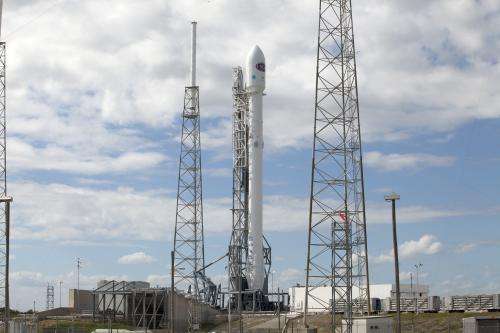Image: DSCOVR on the launch pad

This photo shows the SpaceX Falcon 9 rocket set to launch NOAA's Deep Space Climate Observatory spacecraft, or DSCOVR, at the Space Launch Complex 40 at Cape Canaveral Air Force Station in Florida.
The next launch attempt for the DSCOVR mission will now be Tuesday, Feb. 10, at 6:05 p.m. EST with a backup launch opportunity on Wednesday, Feb 11 at 6:03 p.m. Weather for an attempt on Monday, Feb 9 is unfavorable. If that attempt were to scrub for weather, we would lose either the Tuesday or Wednesday launch opportunity due to crew rest requirements for the Air Force. Teams will target launch on Tuesday with a backup of Wednesday as weather is more favorable on both of those days. While it is not required for flight, SpaceX will leverage the extra time to replace a video transmitter on the first stage in advance of the next attempt.
DSCOVR is a partnership between NOAA, NASA and the U.S. Air Force. The observatory will maintain the nation's solar wind observations, which are critical to the accuracy and lead time of NOAA's space weather alerts, forecasts, and warnings. Space weather events like geomagnetic storms caused by changes in solar wind can affect public infrastructure systems, including power grids, telecommunications systems, and aircraft avionics. DSCOVR will succeed NASA's Advanced Composition Explorer (ACE) in supporting solar observations and provide 15 to 60 minute warning time to improve predictions of geomagnetic storm impact locations.
More information: To learn more about DSCOVR, visit www.nesdis.noaa.gov/DSCOVR.
Provided by NASA





















